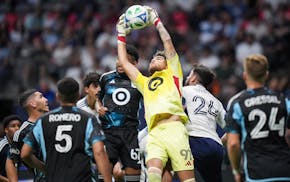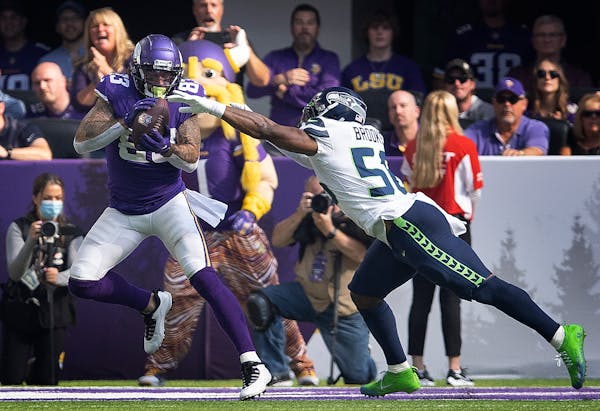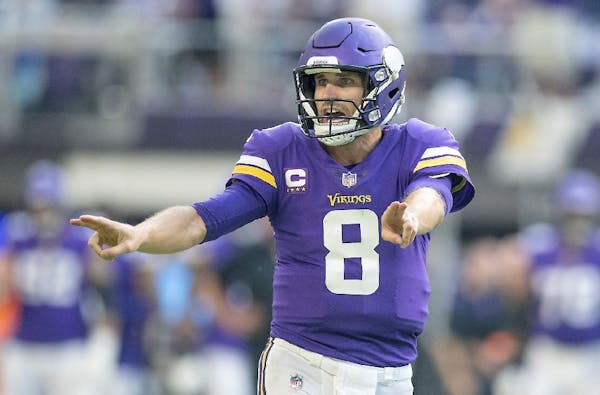The path that led Klint Kubiak back to Minnesota, and eventually allowed him to become an NFL offensive coordinator for the first time at age 33, began three years ago with a Vikings loss to the Seahawks.
Shortly after the Vikings landed at Minneapolis-St. Paul International Airport the morning of Dec. 11, 2018, following a Monday night loss in which they'd narrowly escaped a shutout, coach Mike Zimmer ended months of disagreement with John DeFilippo by firing the first-year coordinator. Zimmer gave the interim coordinator title to quarterbacks coach Kevin Stefanski. When the Vikings removed the interim tag following the season, one of Stefanski's first moves was to reach out to Kubiak, who'd worked by his side as an offensive quality control assistant from 2013-14, about being the quarterbacks coach.
Their relationship led to Kubiak bringing his father, Gary, and a pair of longtime Kubiak assistants (tight ends coach Brian Pariani and offensive line coach Rick Dennison) to Minnesota. The Vikings committed to the Kubiak version of the West Coast offense that had taken root around the league with coaches such as Kyle Shanahan and Sean McVay. Even though the play-calling title passed from Stefanski in 2019 to Gary Kubiak in 2020 and onto Klint Kubiak in 2021, the identity of the Vikings' offense — a commitment to outside zone runs, as well as play action and bootlegs with the quarterback under center — remained the same.
Statistically, the Vikings have had better offensive days in Zimmer's eight seasons as head coach than the 30-point, 453-yard showing Sunday he called the best of his time in Minnesota. And the significance of the win, following seven consecutive losses to the Seahawks, wasn't something the coach was interested in entertaining; he cut off his postgame news conference after a question he didn't like about the Vikings' history against Seattle.
But given the context of the game — an 0-2 Vikings team, playing without Dalvin Cook in a home opener they desperately needed to win, facing an opponent they badly wanted to beat — it's tough to imagine the offense making a more emphatic statement on behalf of its first-year play-caller than it did Sunday.
The Vikings' third-down conversion rate of 64.3% matched their 2017 Week 1 win over the Saints for their third-best mark under Zimmer. They held the ball for 35 minutes, 53 seconds without Cook and averaged 8.03 net yards per passing attempt, in a game where Kirk Cousins completed 30 of his 38 passes and was sacked only once.
"He did a good job last week, too," Zimmer said of Kubiak. "And the first week, I mean, I don't know who could have called a good game on second-and-20 and third-and-20. But he called a good game again [Sunday]. He's also getting a lot of help from these other offensive coaches: [running backs coach] Kennedy Polamalu's doing a great job, and [wide receivers coach] Keenan McCardell, and [offensive line coach] Phil Rauscher. [Tight ends coach Brian] Pariani. … Andrew Janocko, [the coach] with the quarterback, I think he's done a nice job with him. It's a good collective thing where we figure out, 'OK, how can we affect this defense and what plays can we work to get to it?'"
Kubiak has continued to put his own stamp on the Vikings' scheme; with tight end Irv Smith Jr. hurt and K.J. Osborn emerging, the Vikings were lining up in three-receiver sets almost twice as much as they did last year, according to Sharp Football Stats. They've used play action far less frequently through the first three weeks of the season, but have employed more pre-snap motion to gain advantages in the running game.
They've also opened up the playbook. On their first drive of the second half, they split Alexander Mattison out wide and lined wide receiver Adam Thielen up in the backfield; Kubiak ran Mattison out of an inverted wishbone formation later on the drive.
Just before halftime on Sunday, the Vikings ran Cousins out of a zone read look, and two plays later, they lined tight end Tyler Conklin up wide and put Thielen in the slot, using the receiver's route to create a free release for Conklin and an easy 16-yard completion that set up Justin Jefferson's touchdown.
"It was just a play we had in knowing one read was for man, one read was for zone," Conklin said. "You line up out there and you see you have a linebacker on you, you know you have man coverage. You kind of expect the ball fast. That's one of those plays where you practice it, you drill it and then game comes and it happens just how you practiced it."
The Vikings created several big plays out of bunch sets and stacked receiver looks. Cousins' 28-yard completion to Jefferson in the third quarter came as Osborn's downfield route cleared out a safety and Ameer Abdullah occupied a linebacker, creating room for the receiver over the middle. According to NFL Next Gen Stats, Cousins threw for 148 of his 323 yards over the middle, as the Vikings feasted on crossing routes that left Jefferson and Thielen open for much of the game.
Kubiak spent the past two years as Cousins' quarterbacks coach, and through three weeks, he's benefited from Cousins playing some of the most assertive football of his career. The quarterback is getting rid of the ball faster than all but six passers in the league, according to Next Gen Stats, ditching his tendency to hold the ball and invite pressure as he waits for plays to develop. After he was sacked three times in the Vikings' season-opening loss to the Bengals, Cousins has been sacked once each against the Cardinals and Seahawks.
"I think he's a guy who now is able to be in the third year of this system and be around a lot of us players, and he just kind of trusts us and trusts the system," Thielen said. "Trust the O-line. I think we haven't given any of those guys any credit. They did a great job. Usually, when you're not talking about the O-line, it's a good thing."
The Vikings are still 1-2, and their offense has its issues. Cousins pointed out the inability to score touchdowns on three second-half drives that ended in field goals Sunday, and while the team has cut down on its second-and-long runs in the first three weeks of the season, it still runs more than expected with eight or more yards to go on second down and has been successful on only 33.7% of its runs overall, according to data from NFLFastR.
It's worth wondering whether the line will hold up, whether Cousins will be prone to a stretch of inefficient play as he's done in the past and what happens if Cook's health becomes a recurring issue.
Even if they did it against a depleted Seahawks defense, the Vikings cleared out a fair amount of baggage on offense with Sunday's win. And a week before Stefanski, his close friend and mentor, comes back to town, Kubiak could point to some success.
"He knows what we're really good at and just lets us go to work, and that's all you can ask for as a player," Thielen said.
TWO PLAYERS WHO STOOD OUT
Everson Griffen: Even before he got his first sack of the season — and reintroduced Vikings fans to the "Sack Daddy" dance — in the third quarter, Griffen had made his presence felt as a situational pass rusher. He pressured Wilson on the previous play when he didn't bite on a screen and remained focused on the quarterback, and generated his sack off his spin move before jumping a gap inside of Dalvin Tomlinson. The Vikings continue using Griffen as an interior rusher in a third-down pass-rushing package, and he's showing he's still got plenty left as a pass rusher at age 33.
Justin Jefferson: His nine-catch, 118-yard day was a route-running clinic. His two biggest gains were on crossing routes, but most of his targets came on out-breaking routes within 10 yards of the line of scrimmage, like the whip route he used to get away from D.J. Reed on his 3-yard touchdown. On a second-and-14 in the third quarter, Jefferson drove Tre Flowers downfield, before stopping suddenly and turning back to Cousins while Flowers ran five yards past him. According to NFL Next Gen Stats, Jefferson averaged 4.16 yards of separation from his closest defender.
TWO AREAS OF CONCERN
Run defense: While the Vikings held the Seahawks to 81 yards in the second half, the game flow (and an injury to Chris Carson) might have helped cover up a facet of their defense that had been exposed in the first half. After running 14 times for 90 yards in the first half, Seattle had only four attempts for 16 yards in the second half — and one of those four was a fourth-quarter Wilson scramble. Carson, who limped off holding his hamstring after his first carry of the third quarter, had 10 carries for 74 yards in the first half. His 30-yard touchdown came when Wilson checked to a run against a three-lineman look and Carson hit a big hole between Stephen Weatherly and Blake Lynch, winning a footrace with Eric Kendricks after the middle linebacker attacked the B gap and tried to recover when Carson found space outside. The Vikings were 21st in the league against the run before Sunday; they'll be tested against a Browns offense that commits to the run with Nick Chubb and Kareem Hunt, and they'll have to tackle better than they did against Seattle.
Running back health: The Vikings were holding out hope last week that Cook could play despite a sprained right ankle, but Zimmer said he got a text Sunday morning saying the running back wouldn't be able to go. The team's athletic training staff worked on Mattison's calf as he limped off in the fourth quarter, and Mattison said after the game he was "feeling every single one of those" career-high 32 touches, which were the third-most by a NFL running back this season. The Vikings didn't call A.J. Rose up from their practice squad before Sunday's game, and used C.J. Ham in a single-back set near the goal line in the fourth quarter, but as heavily as they lean on their running game, they need Cook and Mattison healthy.
ONE BIG QUESTION
Does this win mean the Vikings are back on the right track? It was an impressive victory, both because of how the offense played and because of what the defense did to shut down Wilson in the second half. It shouldn't be forgotten, though, that the Vikings gave up more than 300 yards in the first half, when they had tackling issues and saw Wilson go after Bashaud Breeland. Stefanski's offense will be a tough assignment for the Vikings, as Chubb and Hunt run behind one of the league's best offensive lines, and Myles Garrett (who posted 4½ sacks on Sunday) will test Rashod Hill. A loss there would put the Vikings back at 1-3, in a conference that has three of the NFL's five 3-0 teams. It seems going forward the biggest questions might reside in the Vikings' secondary, particularly during a tough stretch of road games after the team's Week 7 bye.
But the past two weeks, and Sunday especially, have reinforced two ideas: The Vikings' offense can put up points, and their defensive staff remains adept at making mid-game adjustments. If those things continue to prove true, the Vikings should remain competitive in the NFC.
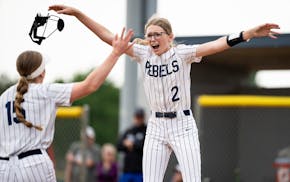
Champlin Park shuts out Rogers 1-0 to win Class 4A, Section 5 softball title

Twins affiliate rained out more than any team: 'Never seen anything like this'
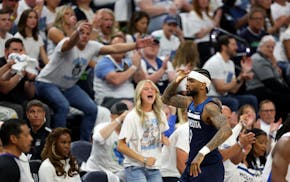
Three key Timberwolves players could enter free agent market
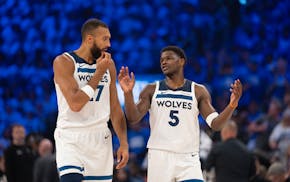
Souhan: If Edwards is a franchise player, he needs to act and play like it
